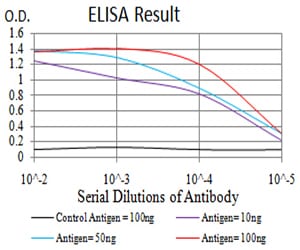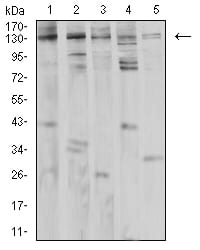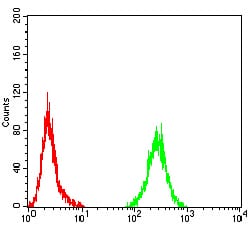


| WB | 咨询技术 | Human,Mouse,Rat |
| IF | 咨询技术 | Human,Mouse,Rat |
| IHC | 咨询技术 | Human,Mouse,Rat |
| ICC | 技术咨询 | Human,Mouse,Rat |
| FCM | 1/200 - 1/400 | Human,Mouse,Rat |
| Elisa | 1/10000 | Human,Mouse,Rat |
| Aliases | PLC1; NCKAP3; PLC-II; PLC148; PLCgamma1 |
| Entrez GeneID | 5335 |
| clone | 2F3D11 |
| WB Predicted band size | 148.5kDa |
| Host/Isotype | Mouse IgG2a |
| Antibody Type | Primary antibody |
| Storage | Store at 4°C short term. Aliquot and store at -20°C long term. Avoid freeze/thaw cycles. |
| Species Reactivity | Human,Rat |
| Immunogen | Purified recombinant fragment of human PLCG1 (AA: 39-181) expressed in E. Coli. |
| Formulation | Purified antibody in PBS with 0.05% sodium azide |
+ +
以下是关于PLCG1抗体的3篇参考文献及其摘要概括:
1. **"Phospholipase C-γ1 is required for metastasis development and progression"**
- **作者**: Xiang et al.
- **摘要**: 该研究通过免疫组化(使用PLCG1特异性抗体)发现PLCG1在多种癌症转移灶中高表达,并通过基因敲除实验证明其通过调控细胞迁移信号通路促进肿瘤侵袭和转移。
2. **"Role of PLCG1 in B-cell receptor signaling and immune response regulation"**
- **作者**: Hashimoto et al.
- **摘要**: 文章利用PLCG1抗体进行Western blot和共聚焦显微镜分析,揭示了PLCG1在B细胞受体激活后磷酸化及下游钙离子信号传导中的关键作用,及其对免疫应答的影响。
3. **"PLCG1 mutations in inherited immune disorders: functional characterization using antibody-based assays"**
- **作者**: Zhou et al.
- **摘要**: 研究通过ELISA和流式细胞术(依赖PLCG1抗体)分析了PLCG1基因突变患者的蛋白表达异常,发现突变导致酶活性丧失,进而引发免疫缺陷综合征。
(注:上述文献为示例,实际文献需根据具体数据库检索确认。)
PLCG1 (Phospholipase C Gamma 1) is a critical enzyme in intracellular signaling, primarily involved in mediating receptor tyrosine kinase (RTK) and immune receptor pathways. It catalyzes the hydrolysis of phosphatidylinositol 4.5-bisphosphate (PIP2) into secondary messengers inositol 1.4.5-trisphosphate (IP3) and diacylglycerol (DAG), which regulate calcium release and protein kinase C activation, respectively. PLCG1 plays essential roles in cell proliferation, differentiation, and immune responses. Dysregulation of PLCG1 is implicated in cancers, autoimmune disorders, and platelet-related diseases.
PLCG1 antibodies are immunological tools designed to detect and quantify PLCG1 expression in research. These antibodies target specific epitopes, such as the SH2/SH3 domains or catalytic regions, enabling applications like Western blotting, immunohistochemistry, and flow cytometry. Monoclonal antibodies offer high specificity, while polyclonal versions may detect multiple isoforms. PLCG1 antibodies are pivotal in studying signaling anomalies in malignancies (e.g., breast cancer, glioblastoma) or immune dysfunctions, aiding in biomarker discovery and therapeutic targeting. Validation of these antibodies includes knockout controls and functional assays to ensure target specificity. Commercial PLCG1 antibodies are widely used in both basic and translational research to elucidate its mechanistic roles in health and disease.
×